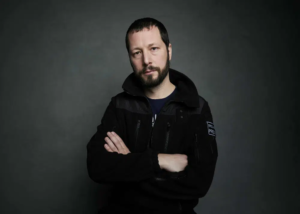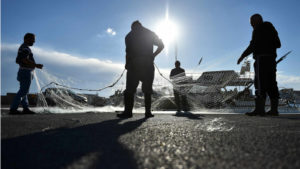On Feb. 8, in a jarring answer to a question from the media, Russian President Vladimir Putin said allowing Ukraine to join NATO would increase the prospects of a Russia-NATO conflict that could turn nuclear. Putin’s assertion, made in the context of a complicated hypothetical about an unlikely Ukrainian attempt to take Crimea back from Russia, came during a joint press conference with the President of France, Emmanuel Macron.
With over 100,000 Russian troops amassed at Ukraine’s border, the conference was originally called to discuss ways to de-escalate the situation. However, about 45 minutes into the meeting, Putin made it clear there were some lines that could not be crossed without severe and possibly even nuclear consequences.
“[T]here will be no winners,” he said, describing a hypothetical future in which Ukraine had joined NATO and then attempted to invade Russian-occupied Crimea, “and you will find yourself drawn into this conflict against your will. You will be fulfilling Article 5 in a heartbeat, even before you know it.”
Article 5 of NATO’s founding treaty says that any attack on a NATO member is an attack on all members. This principle of collective defense, NATO says, is at the heart of its treaty. The only time the article has been invoked was on September 11, 2001, when terrorists attacked the United States.
“Do you realize that if Ukraine joins NATO and decides to take Crimea back through military means, the European countries will automatically get drawn into a military conflict with Russia?” Putin said. “Of course, NATO’s united potential and that of Russia are incomparable.”
Though the Kremlin’s English-language transcript has Putin using, somewhat ambiguously, the term “incomparable,” he also asserted that Russia “is one of the world’s leading nuclear powers and is superior to many of those countries in terms of the number of modern nuclear force components.”
And Putin is correct. In early 2021, Nuclear Notebook authors Hans M. Kristensen and Matt Korda estimated that Russia has a stockpile of nearly 4,500 nuclear warheads, which is more than enough weapons to obliterate countless cities and military facilities, setting massive fires, the smoke from which would send the world into nuclear winter. The United States has about 3,800 nuclear warheads and another 1,750 retired warheads awaiting dismantlement, a force that also has civilization-ending capabilities. The nuclear arsenals of the United Kingdom and France are small by comparison but still powerful enough to cause mass death and environmental damage.
As it has amassed military forces on the borders of Ukraine, Russia has proposed two draft treaties, one with NATO and one with the United States, that seek a variety of security guarantees, including one that would prohibit further eastward expansion of NATO and therefore not allow Ukraine to join. The United States and its NATO allies have rebuffed that suggestion even as talks on de-escalating tensions around Ukraine have continued.




